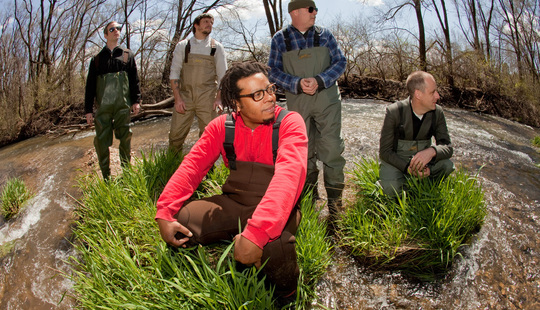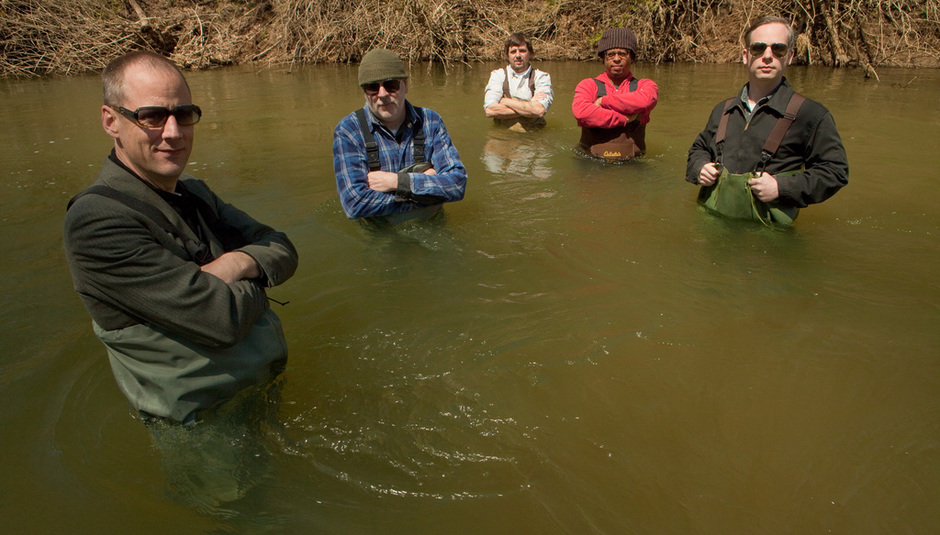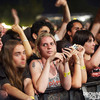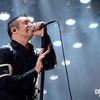Last month Chicago's questing instrumental-rock elder statesmen Tortoise returned with their first full-length album since 2004, in the form of Beacons of Ancestorship, which netted itself a tasty 8/10 from DiS just the other week.
DiS caught up with multi instrumentalist Dan Bitney by email before the band flew off for their performance at the Synch Festival in Greece to talk about the new album, the sum of their various personal sounds and, occasionally, reptiles and marimbas...
DiS: Where did the title Beacons of Ancestorship come from?
DB: [John] McEntire found this author John Barton Wolgamot, [and Beacons Of Ancestorship is] the title of his third book, he was the guy who wrote the original text for [book-length experimental poem] In Sarah.... The texts of all three books were the same, only the titles were different. Each text was 128 pages of basically this sentence with small permutations of the adverbs and different names:
In her very truly great manners of Johannes Brahms very heroically Sara Powell Haardt had very allegorically come amongst his very really grand men and women to Clarence Day, Jr., John Donne, Ruggiero Leoncavalo, James Owen Hannay, Gustav Frenssen, Thomas Beer, Joris Karl Huysmans and Franz Peter Schubert very titanically.
Dude's phone number was Monument Six One Thousand [which gives its name to a track on BOA].
DiS: It sounds like the title may have stemmed from an accumulation of your past sound, that it almost seems self-influenced?
DB: Our sound is an accumulation of music that we like, hopefully the inspiration isn't obvious and the music created from these influences gives the impression of a new unnameable form.
Self-influence is dangerous, we needed to move ahead and take bigger steps away from our trademarked style. We didn't want to repeat ourselves.
DiS: Was that a simple step to make or something that demanded a shift in the dynamics of your sound instrumentally?
DB: I think it needed to be addressed instrumentally; we had the idea to move away from the mallet instruments into a more layered synth sound (high class slim+charteroak foundation). Having said that, it's not as huge of a step as, say, making a doo-wop record or an all improvised ten disc series. But no simple steps here. Even in creating these songs there were several times that I thought 'it has never been this hard to write songs', or that the pressure was never higher to make a more different record, more of a step than from Standards to It’s All Around You.

DiS: Would you consider it to be a marker for the rest of your back catalogue to new listeners, or a new chapter post-A Lazarus Taxon?
DB: Both, I guess. Being a group for so long we have a wide demographic, so you hope new listeners will check out where we came from. But to put it very simply we are just psyched to have new material to present to squares, hippies, hipsters and old heads.
DiS: Arrangements seem to be far more juxtaposed with each other on BOA, in the sense that a lot of your other work has a natural flow without in comparison to this record. Was this something you sought out during the writing process?
DB: I think with this record it was more that everybody came with ideas and at this time it seemed refreshing to have minimal hip-hop influences next to mutant sambas and beautiful Doug McCombs ballads. I think that the parameters of what seems appropriate for a TRTS song had to open up a bit, where as in the past some of these genres/ideas would be saved for other projects.
DiS: How does your writing process work? Does McEntire have a musical director role within the process or is there an all round feeling of direction in terms of each member? Is there direction at all?
DB: Basically people make demos of ideas, some with the structure and others with an element to start from. I find with my demos I really hope that people will add elements I never even thought of, to take it somewhere else. Really we're all musical directors but we owe a lot to McEntire’s engineering skills.
Video: Tortoise: 'Prepare Your Coffin'
DiS: The album seems to be far more electronically led than It’s All Around You. Was this a natural progression or something more controlled and thought out? Was it an exercise in new production techniques you’ve accumulated as well?
DB: There was talk initially of having a more layered synth aesthetic to BOA. People weren't writing for the vibraphone. My joke was that I had a 20-minute piece for five vibraphones that I was bringing to the table called ‘Rteve Siech’ but, yes, natural and thought out. And yes everything we do is an exercise in new production, production to me really saved some of these pieces, the dulcimer and guitar solo added to 'Gigantes' after the final mix was done and the down-pitched drums of 'Monument Six One Thousand'.
DiS: A lot is said about the translation from live to record for a lot of bands, is that something you struggle with at all?
DB: Yeah, it’s really hard for us at times. We don't really think about how to reproduce songs live when we're creating them, we're trying to make the most of these ideas while recording, so when it’s time to learn how to play them it gets really tricky with people jumping between several instruments in a single song, I'm worried that this could seem pretentious and have suggested that with the next record we each choose an instrument and stick with it.
DiS: It doesn't feel pretentious; would there not be the potential of stagnation if you were all somewhat confined to one instrument?
DB: At this point, I would see it as a challenge but, yes, you have a great sonic diversity if your elements are shifting mid composition. Although with such a concept the songs structures and dynamics could be more extreme as long as it wasn't Tortoise Swings (jazz standards) or Surfing With Morricone And Tort. Genre-specific I guess is what I mean.
DiS: Taking time away with your other bands must have an influence on your ideas being brought back into the Tortoise fold...
DB: It all helps as far as the music goes and in general we've all known each other for so long that there aren't really any surprises. But having said that we are a bit older, some of us have children so our touring is cut down to three week runs at a time, which works for me. I tend to start snapping at the two week mark of tours.
DiS: I’m sure you’ll be asked this a bunch of times, but what does [name of BOA track] ‘Yinxianghechengqi’ mean?
DB: I guess it means 'synthesizer' in Chinese, I was told it was the name of the first synth produced in China. Having said that, most titles are afterthoughts, this piece was known to us as 'Omni Chord', named after a synth auto harp with a strum pad that the song was written with.
DiS: While your music has the ability to transcend the premise of genre, there must be inevitable themes or emotions behind each album. What was the collective angle towards Beacons Of Ancestorship?
DB: Most angles or themes of mine go out the window once the songs start coming to life on their own. It's better, I find, to let the songs develop on their own. With that said really the biggest pressure was that this one would be a bigger step forward than the step between Standards and It’s All Around You. It’s also been a while since we wrote together but the real only theme I can think of was no mallet instruments! But not to worry, we're still bringing the vibes on tours.
DiS: Obviously, having been going for a good amount of time now, pretenders to your musical throne were bound to pop up. But what’s your opinion on bands like The Mercury Program treading that line of influence?
DB: You know we all start somewhere, I don't know this band and I haven't always been the most creative musician on earth. I don't really think we started a movement and I keep checking our rehearsal space for this throne, nobody’s seen it ever, maybe we left it somewhere. When kids start out their sound might not be that original but one hopes that they try and take it somewhere that’s new unless they just want to be superstars then originality doesn't matter and describing the music should be easy. I guess we just want to be respected musicians and of course that people want to hear our jams.
DiS: And finally, as it does seem an appropriate question to ask, what is your own favourite reptile and why?
DB: I've never really given it much thought, but have thought I resemble a turtle at times. How about a Jesus Lizard, the reason being, I guess they're reforming and playing shows this summer.






















